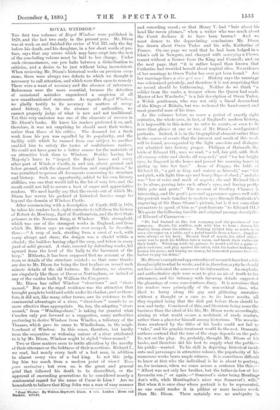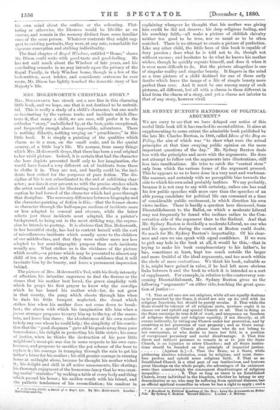ROYAL WINDSOR.* THE first two volumes of Royal Windsor were
published in 1879, and the last two early in the present year. Mr. Dixon was at work on and finished the revise of Vol. III. only the day before his death, and his daughter, in a few short words of pre- face, says that any errors which may have crept into the text of the concluding volume must be laid to her charge. Under such circumstances, our pen halts between a disinclination to criticise, and a desire to be just without being inconsistent. When reviewing Mr. Dixon's historical works on previous occa- sions, there were always two defects to which we thought it necessary to call attention, and which were then open to remedy. These were a want of accuracy and the absence of references. References were the more essential, because the detection of occasional mistakes engendered a suspicion of all new unauthenticated statements. As regards Royal 'Windsor, we gladly testify to its " accuracy in matters of recog- nised history, but, in the absence of authorities, we cannot properly judge of what is new and not traditional. Yet this very omission was one of the elements of success in Mr. Dixon's books. He knew his readers preferred it so, and, therefore, it was not surprising he should meet their wishes, rather than those of his critics. The demand for a fresh work from his pen was equalled by its popularity, and the facility with which he roamed from one subject to another enabled him to satisfy the tastes of multifarious readers. He could not have gone to a better source for the materials of an attractive book than to Windsor. Besides having her Majesty's leave to "inspect the Royal house and every other part of Windsor Castle, in and 'out, above ground and below ground, with the utmost freedom and completeness," he was permitted to peruse all documents concerning its structure and history. Such an opportunity, added to his owu literary abilities, was one that would fall to the lot of very few, and the result could not fail to secure a host of eager and appreciative readers. We need hardly say that the events out of which Mr. Dixon has woven his garland of historical fancies range far beyond the domain of Windsor Castle.
After commencing with a description of Castle Hill iu 1878, he takes his readers back eight centuries to tell them the history of Robert de Mowbray, Earl of Northumbria, and the first State prisoner in the Norman Keep, at Windsor. This stronghold, which was one of the strongest works in England, and from which Mr. Dixon says no captive ever escaped, he describes thus :—" A crop of rock, starting from a crest of rock, with scarp abrupt and sheer, the donjon was a citadel within a citadel ; the builders having edged the crop, and taken in every yard of solid ground. A stair, covered by defending works, led upward from the level of the baily to the basement of the keep." Hitherto, it has been supposed that no account of the .form or details of the structure existed ; so that some thanks are due to Mr. Dixon for being the first to place on record such minute details of the old fortress. Its features, we observe, are singularly like those of Dover or Nottingham, or indeed of any of the castles built by William the Conqueror.
Mr. Dixon has called Windsor " river-born " and "river- named." But as the royal residence was the attraction that brought people to build and settle under its shadow, and as there- fore, it did not, like many other towns, owe its existence to the commercial advantages of a river, " river-born " sounds to us more effective than appropriate. So, too, the adopting "river- named," from "Winding-shore," is taking for granted what Camden only put forward as a suggestion, many authorities preferring to derive Windsor from Windles, a tributary of the Thames, which gave its name to Windlesham, in the neigh- bourhood of Windsor. In this sense, therefore, but hardly from the serpentine or widening nature of a river attributed to it by Mr. Dixon, Windsor might be styled "river-named."
Two or three matters seem to invite attention by the novelty of their utterance or the boldness of their assertions. Richard I., we read, had nearly every fault of a bad man, in addition to almost every vice of a bad king. Is not this judg- ing him too much from a modern point of view ? Tem- pora mutaneur ; but even so, is the great and general grief that followed his death to be discredited, or the approval of succeeding generations to be considered merely a sentimental regard for the name of Coeur de Lion ? Are we henceforth to believe that King John was a man of easy manner * Royal Windsor. By William Hepworth Dixon. 4 vols. London : Hurst and Blackett. 1379-80.
and conceding mood ; or that Henry V. had " hair about his head like raven plumes," when a writer who was much about the Court declares it to have been brown ? And we must demur to the depreciating conclusions Mr. Dixon has drawn about Owen Tudor and his wife, Katherine of France. On one page we read that he had been lodged in a felon's cell in Newgate, and charged with marrying a Crown tenant without a licence from the King and Council ; and on the next page, that "it is rather hoped than known that Catherine had troubled herself about nuptial rites. No evidence of her marriage to Owen Tudor has ever yet been found." Are her marriage-lines a sine god non ? History says the marriage was solemnised privately, and therefore it is not surprising that no record should be forthcoming. Neither do we think "a soldier from the ranks, a trooper whom the Queen had made Master of her Wardrobe," is a fair description of Owen Tudor, a Welsh gentleman, who was not only a lineal descendant of the Kings of Britain, but was reckoned the handsomest and most graceful man of his time.
As the volumes before us cover a period of exactly eight
centuries, the whole area, in fact, of England's modern history, it is impossible in this notice to refer to events, or even to do more than glance at one or two of Mr. Dixon's word-painted portraits. Indeed, it is in the biographical element rather than in the course of events that the interest and merit of this work will be found, accompanied by the light anecdote and dialogue uot admitted into history proper. Philippa of Hainault, the bride of Edward M., was, we read, " a tall, fair girl, with flesh all creamy-white and cheeks all rosy-red ;" and " for her bright eyes, be lingered in the house and passed his morning hours in gazing up into her face." Anne of Prague, the bride of
Richard 11., " a girl as limp and watery as himself," was " fat and pink, with light blue eye and heavy flaps of cheek ;" and she
was "low of voice and meek of aspect ; she and Richard liked to be alone, peering into each other's eyes, and having pretty little pets and pouts." The account of Geoffrey Chaucer is interesting, and the poet's personal appearance agrees well with the portrait made familiar to modern eyes through Houbraken's engraving of Sir Hans Sloane's picture, but is it not somewhat premature to speak of him as "poet-laureate "to Edward III.? We quote the following forcible and original passage descriptiv.., of Edward of Carnarvon "Ile had learned to like low company and the pastimes of low company. Morris, his scullion, rode with him to hunt ; James, his dancer, hung about his cabinet. Nothing tickled him so mneh as to see a slut caper on a table, and a yokel tumble from a horse. Jugglers were always at his beck. Though fond of music, his chief enjoy- ment was to push his fiddlers into a room, and break their violins on their heads. 1Vhisking aside his primer, he would call for a game at pitch-and-toss, and play against his usher, with his barber looking on. Losing his game, and having no money, he, borrowed pennies from hi; barber to pay his debts."
Mr. Dixon's exceptional opportunities of research have lent addi- tional weight to what he wrote, and it is, therefore, a pity he should not have indicated the sources of his information. An emphatic and authoritative style were wont to give an air of truth to his utterances, and his intimacy with far-away details suggested the gleanings of some conscientious diary. It is notorious that his readers were principally of the non-critical class, who liked to hurry along the gay and glittering narrative without a thought or a care as to its inner merits, all they required being that the dish put before them should be new and tasty. Convinced of this, and literature being more the • business than the ideal of his life, Mr. Dixon wrote accordingly, aiming at what would secure a multitude of ready readers, rather than a place for himself among historians. The associa- tions awakened by the titles of his books could not fail to "take," and his graphic treatment would do the rest. Dramatic authors contend that the tone of the stage depends on the pub- lic, not on the play. So, probably, thought Mr. Dixon of his books, and therefore did his best to supply what the public— his public—wanted. To his skill in depicting historical incid- ents and personages in attractive colours, the popularity of his numerous works bears ample witness. It is sometim es difficult to know at first who the individual is he is about to portray, as, for instance, when we come across a sentence like this ;— "Albert was not only her brother, but the father-in-law of her favourite son ;" or again,—" Somerset's sister being Hunting. don's wife, while Huntingdon's niece was Somerset's wife." But when it is once clear whose portrait is to be represented, no one could render it in pithier or more incisive words than Mr. Dixon. There certainly was no ambiguity in
his own mind about the outline or the colouring. Flat- tering or otherwise, the likeness would be life-like as on canvas, and remain in the memory distinct from more familiar ones of the same person. Whatever contrasts they might sug- gest to existing portraits, they were, at any rate, remarkable for vigorous conception and striking individuality.
The final chapter of Royal Windsor, entitled "Home," shows Mr. Dixon could write with good-taste and good-feeling. He has not said much about the Windsor of late years, and his concluding remarks in no pay intrude upon the privacy of the Royal Family, in their Windsor home, though in a few of the best-written, most tender, and considerate sentences he ever wrote, Mr. Dixon has lightly touched the domestic story of her Majesty's life.







































 Previous page
Previous page